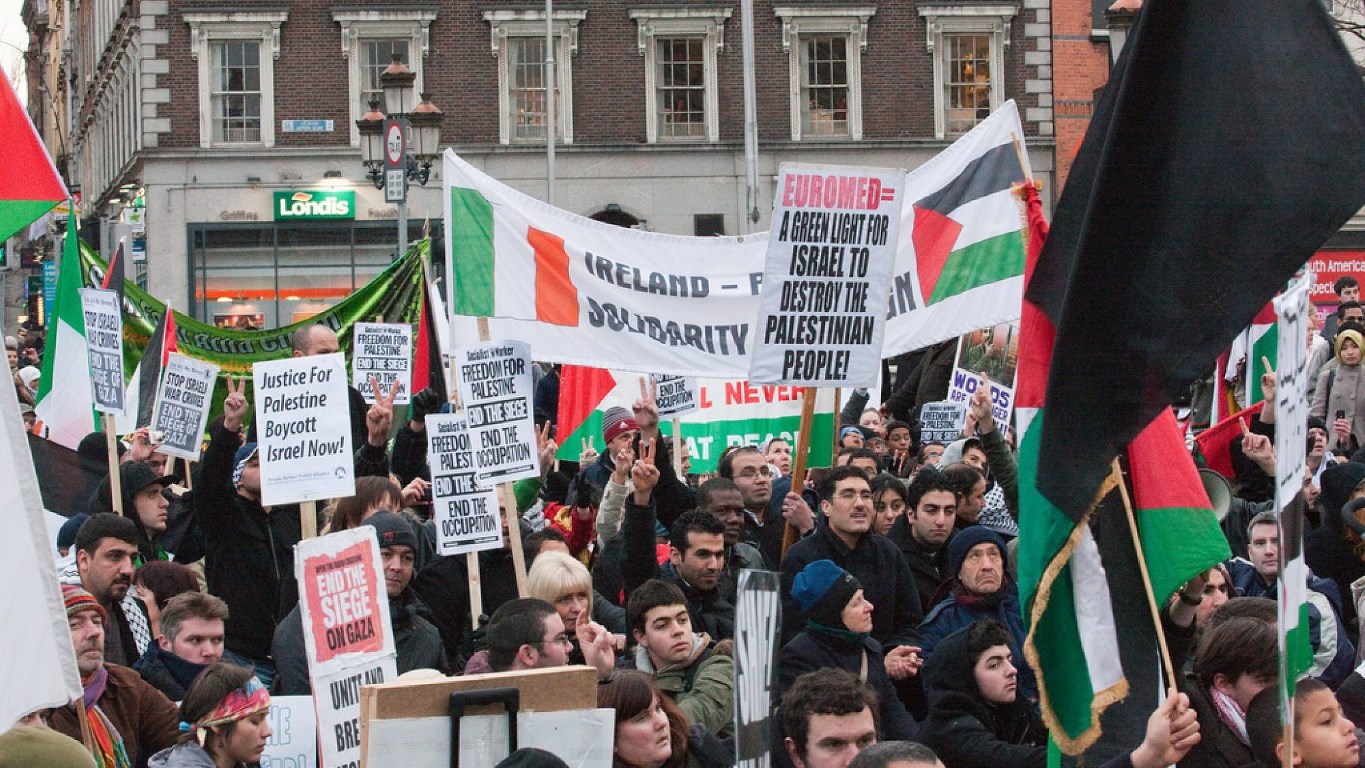Ireland to Prohibit Trade With Occupied Territories?
July 13, 2018 | Expert Insights

The Irish Senate passed a legislation prohibiting the import or sale of goods and services produced in occupied territories around the world.
The legislation will effectively include Israeli settlements in East Jerusalem, West Bank and Syria’s Golan Heights, which are illegal under international law.
Background
The Israeli Declaration of Independence in 1948 by David Ben Gurion ignited a series of wars fought by Arab states against Israel. The Arabs were initially on the offensive, but their military resources dried up when the UN declared an arms embargo on the region. In 1949, Israel signed a series of armistice agreements with the Arab nations involved.
Following the historic Oslo Accords, Palestinian National Authority (PNA) was established as an interim self-government body. However, the authority is undermined by imposition of Israeli law on Palestinian lands. There are over 150 illegal Israeli settlements in occupied East Jerusalem and the West Bank. Israel has also violated international law by claiming the Golan Heights from Syria.
Israel’s illegal settlements have rapidly increased since 1967. Recently they have expressed intent to raze Khan al-Ahmar, a bedouin village in existence before 1947, to the ground. The move would cut off Jerusalem from Area C of the occupied West Bank by destroying the “E1 Corridor.” Area C has been overrun with more than 300,000 Israelis living in 125 illegal settlements and is under Israeli administrative control. The Bedouin way of life is under grave threat as their freedom of movement and right to property have been grossly violated by Israel’s systematic campaign of expulsion.
Ireland was one of the first European countries to call for a Palestinian state in 1980, recognising Israeli statehood only in late 1963. However, Jerusalem itself is considered an Israeli settlement.
Analysis
The proposed Control of Economic Activity (Occupied Territories) Bill was introduced by independent senator Frances Black and drew support from all of Ireland's major political parties except the governing Fine Gael party. Violators of the law could be imprisoned for up to five years and fined up to 250,000 euros.
It passed by 25 votes in favour to 20 against in the Seanad Éireann - Ireland’s Senate. It now moves through eight stages that include a committee meeting and a vote in Ireland’s house of representatives, known as the Dáil Éireann. It becomes law only with the signature of the Irish president.
Many senators cited a 1984 strike by Dunnes Stores workers in Dublin over South African goods produced under apartheid as a precedent for today's action.
"This bold action by Ireland sends an important message to Israel that its occupation of the West Bank and its explicit support for illegal settlements will not continue to go ignored by the international community,” said Barry Trachtenberg, Chair of Jewish History at Wake Forest University in US.
The Palestinian Liberation Organisation (PLO) has commended the move with senior leader Saeb Erekat calling it “historic” and urging other countries to follow suit. However, Israeli foreign ministry spokesman Emmanuel Nahshon said the vote would ruin diplomatic processes in the Middle East.
While other countries, notably the EU, have issued condemnations or moved to label Israeli items produced in occupied Palestinian territories, this bill is believed to be the first which would ban the import of the goods altogether.
The bill can affect US-Irish relations as it could force US firms with Irish divisions or subsidiaries to make a costly choice between violating either Irish law or US law, which prohibits US companies from participating in foreign boycotts that the US government does not endorse. Violations of these anti-boycott laws are punishable by fines and by imprisonment for up to 10 years. The US in 2017 accounted for 67% of all foreign direct investment in Ireland. 700 US companies, notably Apple and Google, which currently employ over 155,000 Irish, use components produced in Israel.
The provisions of the law, however, do not explicitly recognise any particular occupying party like Israel. However, many believe the law has been specifically designed to acknowledge Israeli occupation inspite of other occupied territories like Crimea or Cyprus.
Counterpoint
The measure which is unprecedented for a European Union member would impose a trade barrier within the EU's single market and potentially harm Irish influence in the region.
Assessment
Our assessment is that the proposed law might encounter opposition from the incumbent Fair Gael party, but ought to cater to Irish popular support for the Palestinian cause. We believe that the move, without amendments, might negatively affect the Irish economy. We feel that the objective of the proposed law is to put pressure on Israel for amicable settlements in the Palestinian territory.








Comments